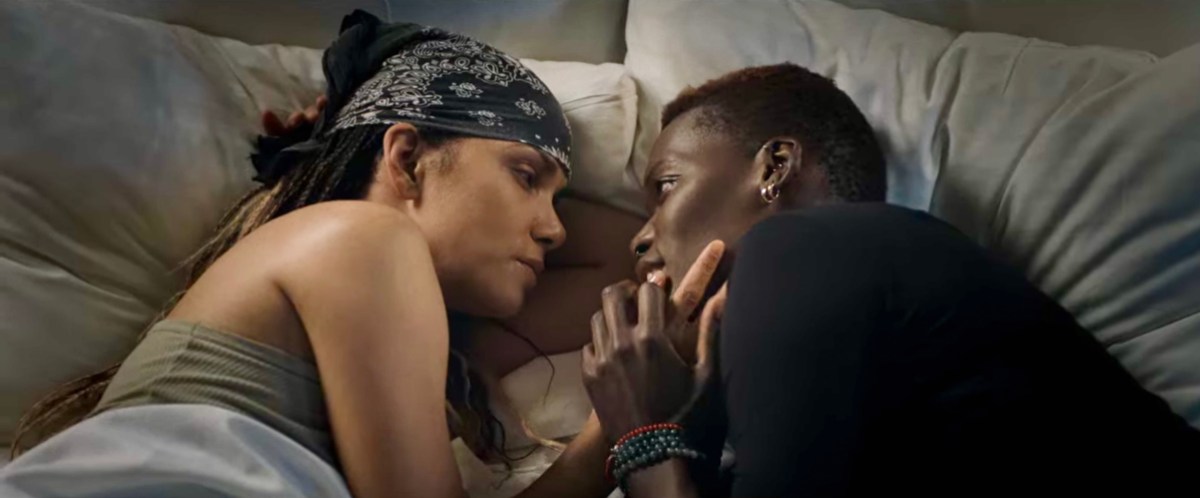The following review for Bruised, in which Halle Berry plays queer MMA fighter Jackie Justice, contains light spoilers of the film.
When I found out that Halle Berry was:
- Going to be making her directorial debut after more 30 years in the industry, while…
- Playing a down-and-out MMA fighter looking for a comeback and…
- That character was going to have a woman love interest
— I nearly pole vaulted over a chair to get to my keyboard fast enough to claim writing this review. Halle Berry starring in a queer version of Creed that’s coming out Thanksgiving weekend? Sign me TF up!
In Bruised Berry is Jackie Justice, a mixed martial arts fighter who left the sport years ago in disgrace. These days, burning just beneath her skin with rage and remorse, Jackie’s locked in an abusive relationship with her alcoholic boyfriend-manager. One night the manager-boyfriend takes Jackie to a incredibly off-the-books basement brawl that leads to her getting back into the cage, this time under the eye of of a new promoter and eventually a new trainer who will become Jackie’s love interest (Buddhakan, played by Shelia Atim — and excuse the pun, I’m a little giddy on leftover Turkey, but she’s a knockout in the role).
Halle Berry didn’t have to completely reinvent the classic “boxing movie” tropes for Bruised to be a success, and to be honest I think the movie would have been better off with a few more Rocky style heart thumping dun-du-dun-duns — not to be out here quoting Kanye West, but “it’s provocative, it gets the people going.” Unfortunately, Bruised veers hard in the other direction, adding complicated layers of family melodrama that soak up plot threads the movie doesn’t have time to adequately address.
Just as Jackie’s preparing her return to the ring, her six-year-old son Manny (Danny Boyd Jr, yet another scene stealer) shows up on her doorstep. Jackie first abandoned Manny as an infant, so there’s a lot to unpack. Manny’s also suffered a trauma of his own, and the PTSD has wrecked him. While all this is unfolding, Jackie’s fraught relationship with her own mother comes to center stage just long enough to highlight that Jackie’s a childhood abuse survivor (Autostraddle readers will want to know there’s discussion of childhood rape), but the film never takes time to directly address the after effects of Jackie’s disclosure.
The result is muddled. Every early review of Bruised that I read mentioned Halle Berry’s historic Oscar win 19 years ago, as if critics are trying to reconcile Bruised’s confusing dramatic swerves. I’d save us all the time and just say: It doesn’t make sense.
The story of a 55 year old fighter making her way back into the match would have been strong enough on its own (hell, Mickey Rourke literally turned an identical story into an Oscar himself). The original screenplay for Bruised centered on a 21-year-old white woman. When Berry took interest, she convinced screenwriter Michelle Rosenfarb to rework the material to fit a protagonist of an older Black woman. That alone is worth the story! Berry’s press tour for Bruised and historic all women’s rap album soundtrack has been some of the most fun of my fall (highlights have included: Halle Berry calling Young M.A “my baby,” Halle Berry sharing that tongue sucking turns her own, and noted bisexual Cardi B wanting to take a bite of Halle to see if her skin is as soft as it appears). Sadly instead of capitalizing on that fun, Bruised made other choices.

But talking about Young M.A and Cardi definitely opens us up to the gay parts of Bruised, so let’s get to it!
If you’re anything like me and your main reasons for seeing Bruised were to see Halle Berry fight and make out with girls, you won’t be disappointed. But you might walk away wishing it had stuck to just those two things.
As Buddhakan, Shelia Atim is stunningly stoic and handsome — the kind of women who will make you gasp at first glance. She’s steady, firm; a never wavering guiding hand in Jackie’s chaos. Buddhakan sees beauty in all of Jackie’s supposedly broken places, she loves and protects Jackie’s son, and whatever other flaws in the film — watching Buddhakan and Jackie navigate falling from friends to lovers is captivating.Their sex scene is as beautiful as any I’ve seen, expanses of melanin intertwined in ways that are breathtaking.
Buddhakan, along with Jackie’s son Manny, is at the center of everything that works well about the film. There’s been this ongoing conversation about Black film (and arguably to its own extent, queer film) about what role trauma depictions play in our stories that get greenlit by Hollywood. On it’s merits, I’m not sure that Bruised is even worth rehashing the discourse (it’s mediocrity does little to draw a spark in me, one way or the other) — but I will say this: Jackie has been carrying around the trauma of her abusive childhood and adulthood for years, and it’s through training with Buddhakan that she begins to heal.
It’s rare that trauma narratives show the mess and muck of healing, but Bruised valiantly lets Jackie falter, get back up, and try again. She steadies her steps — growing as a mother, growing into herself, and learns the hard lesson that she has to repair herself first, before she can reach to help others.
But it’s not “pretty” growth. In fact, following the title of the film it’s pretty (metaphorically,and literally) bloody and bruised.







